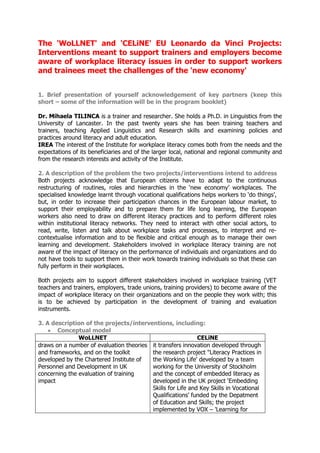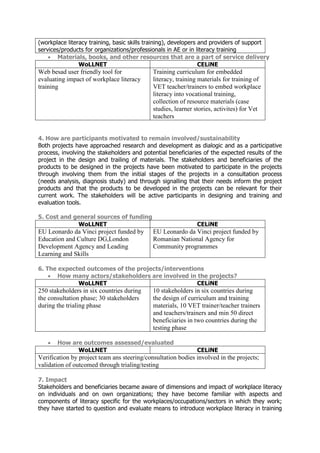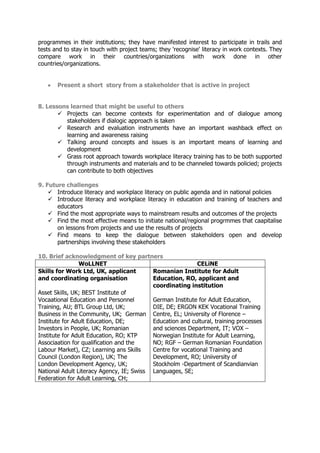Romania_Tilinca_Baku_Wollnet&Celine_intervention
- 1. The 'WoLLNET' and 'CELiNE' EU Leonardo da Vinci Projects: Interventions meant to support trainers and employers become aware of workplace literacy issues in order to support workers and trainees meet the challenges of the 'new economy' 1. Brief presentation of yourself acknowledgement of key partners (keep this short â some of the information will be in the program booklet) Dr. Mihaela TILINCA is a trainer and researcher. She holds a Ph.D. in Linguistics from the University of Lancaster. In the past twenty years she has been training teachers and trainers, teaching Applied Linguistics and Research skills and examining policies and practices around literacy and adult education. IREA The interest of the Institute for workplace literacy comes both from the needs and the expectations of its beneficiaries and of the larger local, national and regional community and from the research interests and activity of the Institute. 2. A description of the problem the two projects/interventions intend to address Both projects acknowledge that European citizens have to adapt to the continuous restructuring of routines, roles and hierarchies in the ânew economyâ workplaces. The specialised knowledge learnt through vocational qualifications helps workers to âdo thingsâ, but, in order to increase their participation chances in the European labour market, to support their employability and to prepare them for life long learning, the European workers also need to draw on different literacy practices and to perform different roles within institutional literacy networks. They need to interact with other social actors, to read, write, listen and talk about workplace tasks and processes, to interpret and re- contextualise information and to be flexible and critical enough as to manage their own learning and development. Stakeholders involved in workplace literacy training are not aware of the impact of literacy on the performance of individuals and organizations and do not have tools to support them in their work towards training individuals so that these can fully perform in their workplaces. Both projects aim to support different stakeholders involved in workplace training (VET teachers and trainers, employers, trade unions, training providers) to become aware of the impact of workplace literacy on their organizations and on the people they work with; this is to be achieved by participation in the development of training and evaluation instruments. 3. A description of the projects/interventions, including: ï· Conceptual model WoLLNET CELiNE draws on a number of evaluation theories and frameworks, and on the toolkit developed by the Chartered Institute of Personnel and Development in UK concerning the evaluation of training impact it transfers innovation developed through the research project "Literacy Practices in the Working Life' developed by a team working for the University of Stockholm and the concept of embedded literacy as developed in the UK project âEmbedding Skills for Life and Key Skills in Vocational Qualificationsâ funded by the Depatment of Education and Skills; the project implemented by VOX â 'Learning for
- 2. Working Life', has also informed work ï· Target groups and their characteristics WoLLNET CELiNE employers, trade unions, providers of workplace literacy skills from six European countries who are involved in developing and piloting the evaluation of workplace literacy skills training. trainers and teachers working in VET adult education in six Europeaan countries who are involved in developing aand trailing training materials to be used in VET teacher/trainer training. ï· Main contents of the projects, describing both the literacy component and the component concerning the particular topic of your panel WoLLNET CELiNE The project researches, trials, pilots and develops a web based, user friendly toolkit to enable employers, providers and unions to evaluate the impact of workplace basic skills training programmes on learning, both at individual and at organizational level; the project team draws on the wash back effect of evaluation to raise awareness of stakeholders involved in developing the tool concerning workplace training and to create dialogue around literacy training in the workplace. The project team works with VET teachers and trainers in documenting the workplace literacy needs of the learners in VET as future workers in the new economy and the competencies the VET teachers/trainers need to acquire in order to support these needs. The documentations phase informs the design of training materials that help teachers of vocational subject embed workplace literacy in training. The training materials will be piloted and validated through training and teaching sessions in two partners countries. ï· Methodology; WoLLNET CELiNE Needs analysis realized in partner countries through desk reseach, survey and focus groups in which 250 stakeholder participated, design of web based tool for evaluation of impact of workplace basic skills training as documented by the research report and needs analysis, two phase trailing of toolkit, and design of final version of toolkit, dissemination of toolkit. Diagnosis realized through desk research in six partner countries on policies, practices and provisions for VET training and workplace basic skills training, identification of set of competences needed by teachers/trainers to embed workplace literacy into VET training, design of training curriculum and training materials to be used for training the VET teachers/trainers to embed workplace literacy into teaching of vocational subjects, consultation with teachers and testing of the materials, finalizing the materials and disseminate them. ï· Main actors/project teams (training, background, etc.) WoLLNET CELiNE Academics with background in adult education/ literacy, researchers in research institutes that focus on adult education, governmental agencies in charge with coordinating training policies for literacy work with adults, providers of CVT for adults
- 3. (workplace literacy training, basic skills training), developers and providers of support services/products for organizations/professionals in AE or in literacy training ï· Materials, books, and other resources that are a part of service delivery WoLLNET CELiNE Web besad user friendly tool for evaluating impact of workplace literacy training Training curriculum for embedded literacy, training materials for training of VET teacher/trainers to embed workplace literacy into vocational training, collection of resource materials (case studies, learner stories, activites) for Vet teachers 4. How are participants motivated to remain involved/sustainability Both projects have approached research and development as dialogic and as a participative process, involving the stakeholders and potential beneficiaries of the expected results of the project in the design and trailing of materials. The stakeholders and beneficiaries of the products to be designed in the projects have been motivated to participate in the projects through involving them from the initial stages of the projects in a consultation process (needs analysis, diagnosis study) and through signalling that their needs inform the project products and that the products to be developed in the projects can be relevant for their current work. The stakeholders will be active participants in designing and training and evaluation tools. 5. Cost and general sources of funding WoLLNET CELiNE EU Leonardo da Vinci project funded by Education and Culture DG,London Development Agency and Leading Learning and Skills EU Leonardo da Vinci project funded by Romanian National Agency for Community programmes 6. The expected outcomes of the projects/interventions ï· How many actors/stakeholders are involved in the projects? WoLLNET CELiNE 250 stakeholders in six countries during the consultation phase; 30 stakeholders during the trialing phase 10 stakeholders in six countries during the design of curriculum and training materials, 10 VET trainer/teacher trainers and teachers/trainers and min 50 direct beneficiaries in two countries during the testing phase ï· How are outcomes assessed/evaluated WoLLNET CELiNE Verification by project team ans steering/consultation bodies involved in the projects; validation of outcomed through trialing/testing 7. Impact Stakeholders and beneficiaries became aware of dimensions and impact of workplace literacy on individuals and on own organizations; they have become familiar with aspects and components of literacy specific for the workplaces/occupations/sectors in which they work; they have started to question and evaluate means to introduce workplace literacy in training
- 4. programmes in their institutions; they have manifested interest to participate in trails and tests and to stay in touch with project teams; they 'recognise' literacy in work contexts. They compare work in their countries/organizations with work done in other countries/organizations. ï· Present a short story from a stakeholder that is active in project 8. Lessons learned that might be useful to others ïž Projects can become contexts for experimentation and of dialogue among stakeholders if dialogic approach is taken ïž Research and evaluation instruments have an important washback effect on learning and awareness raising ïž Talking around concepts and issues is an important means of learning and development ïž Grass root approach towards workplace literacy training has to be both supported through instruments and materials and to be channeled towards policied; projects can contribute to both objectives 9. Future challenges ïž Introduce literacy and workplace literacy on public agenda and in national policies ïž Introduce literacy and workplace literacy in education and training of teachers and educators ïž Find the most appropriate ways to mainstream results and outcomes of the projects ïž Find the most effective means to initiate national/regional progrmmes that caapitalise on lessons from projects and use the results of projects ïž Find means to keep the dialogue between stakeholders open and develop partnerships involving these stakeholders 10. Brief acknowledgment of key partners WoLLNET CELiNE Skills for Work Ltd, UK, applicant and coordinating organisation Asset Skills, UK; BEST Institute of Vocaational Education and Personnel Training, AU; BTL Group Ltd, UK; Business in the Community, UK; German Institute for Adult Education, DE; Investors in People, UK; Romanian Institute for Adult Education, RO; KTP Associaation for qualification and the Labour Market), CZ; Learning ans Skills Council (London Region), UK; The London Development Agency, UK; National Adult Literacy Agency, IE; Swiss Federation for Adult Learning, CH; Romanian Institute for Adult Education, RO, applicant and coordinating institution German Institute for Adult Education, DIE, DE; ERGON KEK Vocational Training Centre, EL; University of Florence â Education and cultural, training processes and sciences Department, IT; VOX â Norwegian Institute for Adult Learning, NO; RGF â German Romanian Foundation Centre for vocational Training and Development, RO; Uniiversity of Stockholm -Department of Scandianvian Languages, SE;




